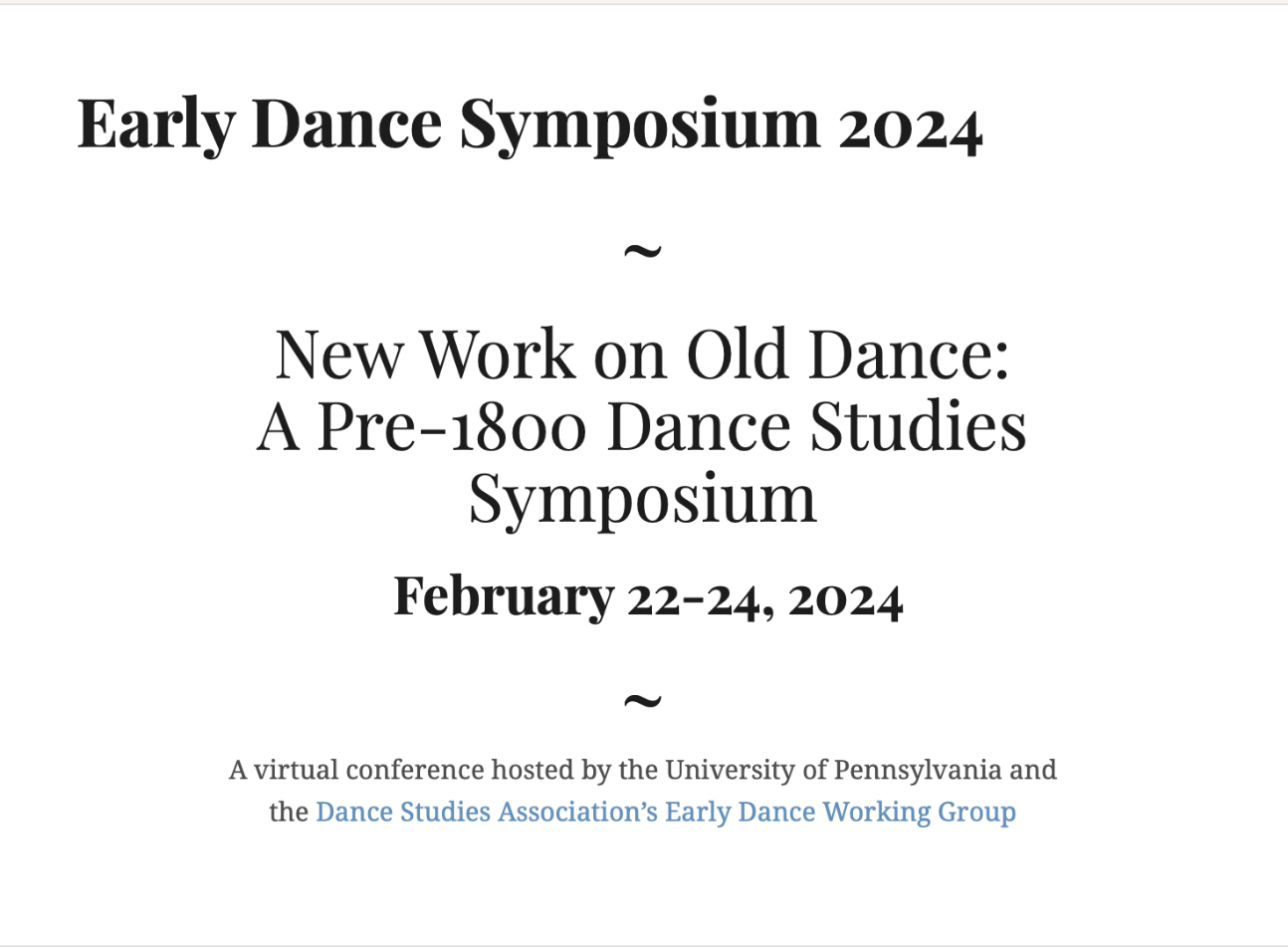
New Work on Old Dance: A Pre-1800 Dance Studies Symposium
February 22-24 2024
Online
Presentation
What does it look like for historical expressions of dancing and movement arts to break out of traditional academic and performative boxes? How do scholars and practitioners escape the boundaries of discipline, chronology, geography, and methodology subsumed under the conventional appellation of “early dance”? Conversely, how can we demonstrate the ways in which our work complements and completes the work of other disciplines in light of these distinctions? This symposium explores early dance as an idea, a time, a place, a locus of cultural meaning and aims to draw together scholars working across disciplines and geographies who are nevertheless invested in “early” dance and movement.
We invite papers for this virtual symposium from scholars across disciplines, exploring aspects of dance and movement from all methodological perspectives, finding commonality in the antecedental nature of their work. Whether looking at the musical, literary, cultural, political, religious, or social contexts of dance, or expanding knowledge of its somatic and kinesthetic dimensions, we find unity in the chronological earliness of our work. We encourage papers that explore dance outside of Western European frameworks of knowledge and movement production, including comparative or transhistorical perspectives on pre-1800 or “early” dance.
Possible Themes for Papers and Presentations
- Dance, music, and choreomusicology
- Notation and choreographies
- Transmission, translation, and circulation
- Expanding geographies (pre-1800 dance across Asia, SWANA, the Americas and beyond)
- Race and racialization in pre-1800 dance practices
- Literature, textuality, and dance
- Representations of dance in art and literature
- Dance as metaphor/metaphors of dance
- Intersections of dance and/in theology, philosophy, theory, theater, art, philosophy, economics, etc.
- Theories and philosophies of dance
- Dance practices from page to stage: recreation, reconstruction, reenactment
- Costuming, clothing, and vestments
- Body politics/political bodies in historical dance
- Sociability and social life
- Translation problems: languages, historical periods, cultures
- Dance or movement as aide-memoire/embodied cognition
- Dance ontologies and dance as a way of knowing
Possible Themes for Roundtables and Forums
- What is “early dance”? Definitions and boundaries
- Early dance in global perspectives: expanding geographies
- Scholar/Practitioner: How does dance training aid or hinder research on early dance?
- Methodologies in Research
- Graduate Studies in Early Dance Studies
- Interdisciplinary scholarship and dance studies: barriers and openings?
- Dance as knowledge production within academia
Format
The program committee welcomes proposals for presentations in several formats, outlined below. Alternative formats may also be proposed. Graduate students, junior scholars, and unaffiliated scholars and performers are especially encouraged to submit proposals.
- Paper presentations
- Work-in-progress presentations (~5-10 minutes)
- Lecture-performances
- Workshops
- Roundtables (for themes listed above or entirely new roundtables)
- A collaborative performance, paper, manifesto, video, etc.
Submission
- Submission due date: Sept. 15, 2023
- Notification of acceptance by Nov. 1, 2023
- Submit proposals via submission portal: https://web.sas.upenn.edu/earlydance/submit
Requirements
-
- Name, affiliation if any, and email address
- Abstract: 250-350 words
- Short bibliography (optional)
- Brief bio (100 words)
- All submissions materials must be in English; see below however
Additional Details
- Individual papers will be 20 minutes in length; shorter roundtable-type contributions are also welcome, as are workshop proposals.
- All presentations will be made as accessible as possible through live captions, downloadable materials with alternative text provided for images, and through other accommodations as needed.
- Although the main language of the conference will be English, participants are welcome to contact symposium organizers to discuss the possibility of presenting in another language.
Contact
- This symposium is organized by members of the Early Dance Working Group of the Dance Studies Association.
- Please contact chair of the Organization Committee, Mary Channen Caldwell (maryca@sas.upenn.edu), with any questions.